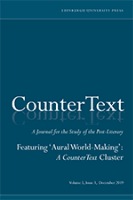
CounterText-A Journal for the Study of the Post-Literary
Scope & Guideline
Challenging Traditions, Shaping Futures
Introduction
Aims and Scopes
- Post-Literary Critique:
The journal focuses on critiques of literary practices and theories in the context of post-literary frameworks, examining how literature interacts with contemporary cultural and technological shifts. - Interdisciplinary Approaches:
It promotes interdisciplinary research that blends literary studies with fields such as philosophy, cultural studies, and media theory, fostering a diverse range of methodologies and perspectives. - Essayistic Forms:
CounterText emphasizes the essay as a significant form of discourse, exploring its evolution and its role in contemporary thought, especially in relation to themes of temporality, identity, and personal narrative. - Mimesis and Representation:
The journal investigates concepts of mimesis and representation, particularly how they relate to current societal issues and artistic expressions, providing critical insights into the processes of becoming and identity. - Posthumanism and Environmental Discourse:
It engages with posthumanist theories and environmental critiques, exploring how literature reflects and responds to ecological crises and the changing nature of humanity in relation to technology and the non-human world.
Trending and Emerging
- Temporalities in Literature:
A growing interest in the concept of temporality, particularly how it influences narrative structures and reader engagement, is evident. This theme reflects broader philosophical inquiries into time in the digital age. - Digital and Post-Internet Narratives:
The journal has increasingly published works exploring post-internet aesthetics and narratives, indicating a trend towards understanding literature in the context of digital culture and technological influence. - Personal and Experiential Essays:
There is a notable rise in the publication of personal essays that blend subjective experience with critical analysis, highlighting the significance of individual narratives in broader cultural discussions. - Posthumanist Perspectives:
Emerging themes related to posthumanism are increasingly prominent, reflecting a critical engagement with the implications of technology and non-human entities in contemporary literature and art. - Intermedial Practices:
The journal is also focusing on intermedial practices that blur the lines between different artistic forms, such as the interplay between visual art, literature, and performance, showcasing a commitment to innovative and hybrid textual forms.
Declining or Waning
- Traditional Literary Canon:
There appears to be a diminishing focus on canonical literary texts and traditional literary analysis, as the journal shifts towards more contemporary and experimental forms of writing and critique. - Historical Literary Contexts:
Research that heavily emphasizes historical contexts of literary works is less frequently published, suggesting a move away from conventional historical literary studies towards more immediate and pressing cultural critiques. - Biographical Criticism:
The journal seems to have reduced publication of biographical analyses of authors, indicating a preference for theoretical and conceptual investigations over individual author-centered narratives. - Static Genre Studies:
Studies that adhere strictly to conventional genre classifications are becoming less common, as the journal embraces hybrid forms and experimental approaches that transcend traditional genre boundaries. - Nostalgic Literary Criticism:
There is a noticeable decline in papers that engage in nostalgic readings of literature, reflecting a contemporary focus on urgent socio-political issues rather than retrospective literary appreciation.
Similar Journals
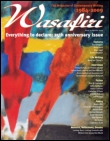
Wasafiri
Exploring the intersections of culture and literature.Wasafiri, published by Routledge Journals, Taylor & Francis Ltd, stands as a pivotal platform in the fields of Cultural Studies and Literature and Literary Theory. With a proud publication history extending from 1984 to 2024, this esteemed journal delivers critical insights and cutting-edge research that explore the intersections of culture, literature, and global discourse. Renowned for its academic rigor, Wasafiri holds a Q3 ranking in both its categories as of 2023, showcasing its solid contributions to the scholarly community, reflected in its respectable Scopus rankings—evidencing its relevance and authority, particularly in the literature field. While available through subscription, the journal emphasizes the dissemination of diverse voices and innovative scholarship, appealing to researchers, professionals, and students eager to deepen their understanding of contemporary cultural narratives. Positioned in the United Kingdom, Wasafiri continues to foster vibrant dialogues that challenge conventional paradigms, making it an invaluable resource for anyone engaged in the humanities.
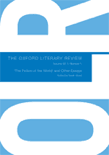
OXFORD LITERARY REVIEW
Unveiling New Perspectives in Literary TheoryOXFORD LITERARY REVIEW, published by EDINBURGH UNIVERSITY PRESS, is a pivotal academic journal in the fields of Cultural Studies and Literature and Literary Theory. With an ISSN of 0305-1498 and an E-ISSN of 1757-1634, the journal has been a crucial forum for interdisciplinary dialogue since its inception in 1996, continuing to uphold its scholarly merit through 2024. Although it currently falls within the Q4 quartile rankings in both cultural studies and literary theory, it provides a unique platform for emerging voices and critical perspectives that enrich our understanding of literature's role in society. The journal operates without open access, encouraging subscription-based access to its rich archives and diverse range of articles. With growing interest in its contributions marked by its Scopus ranks—597th in Literature and Literary Theory and 1002nd in Cultural Studies—OXFORD LITERARY REVIEW remains an essential resource for researchers, professionals, and students seeking to explore contemporary issues in literary discourse.

World Literature Studies
Exploring the Depths of Global Literary DiscourseWorld Literature Studies is a leading academic journal published by the Institute of World Literature at the Slovak Academy of Sciences, dedicated to advancing the field of literary studies. With an ISSN of 1337-9275 and an E-ISSN of 1337-9690, this journal has established itself as a prominent platform for scholarly research and discourse, earning a prestigious Q1 ranking in the Literature and Literary Theory category as of 2023, placing it in the top 25% of journals in its field according to Scopus metrics. Operating from Slovakia, the journal caters to a global audience, highlighting diverse perspectives in world literature and fostering interdisciplinary collaboration. Though it currently offers no Open Access option, it maintains a rigorous peer-review process that ensures the quality and integrity of published works. Researchers, students, and literary professionals alike will find the journal's comprehensive articles and critical analyses essential for staying informed about the latest developments and trends in literature and literary theory.
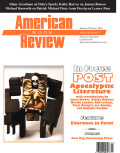
AMERICAN BOOK REVIEW
Navigating the Rich Tapestry of Literary CritiqueAMERICAN BOOK REVIEW is a pivotal journal in the fields of Cultural Studies and Literature and Literary Theory, published by the University of Houston, Victoria - Art & Science. Esteemed for its critical engagement with contemporary literary discourses, the journal provides a platform for scholars and practitioners to explore diverse narratives and theoretical frameworks that shape our understanding of literature. With an ISSN of 0149-9408 and E-ISSN 2153-4578, it serves as an essential resource for those seeking to deepen their insights into the intersection of literature and culture. Although positioned in the Q4 category for both Cultural Studies and Literature in 2023, the journal emphasizes the importance of inclusivity in academic dialogue, aiming to elevate lesser-heard voices in literary critique. Despite its challenging Scopus ranking, its commitment to fostering innovative scholarship makes it a noteworthy asset for researchers, professionals, and students alike. The journal's address is located at 3007 N Ben Wilson, Victoria, TX 77901, United States.

Forum for World Literature Studies
Exploring the Boundaries of Global Literary DiscourseForum for World Literature Studies, published by KNOWLEDGE HUB PUBL CO LTD, stands as a pivotal platform within the humanities, particularly in the realms of Cultural Studies and Literature and Literary Theory. Established in 2009, this academic journal has quickly ascended to a prestigious Q1 ranking as of 2023, reflecting its significant impact in advancing scholarly discourse. With an impressive Scopus ranking—165th out of 1106 in Literature and Literary Theory, and 548th out of 1304 in Cultural Studies—it offers a critical space for researchers, professionals, and students dedicated to exploring the relationships between literature and cultural phenomena. Operating out of Hong Kong, the journal provides a rich selection of peer-reviewed articles that delve into global literary trends, making it an essential resource for anyone wishing to contribute to or deepen their understanding of world literature. With the prospect of open access options enhancing its accessibility, the Forum for World Literature Studies invites submissions that challenge conventional interpretations and foster innovative thinking in literary studies.

LITERATUR UND KRITIK
Exploring the Depths of Literary DiscourseLITERATUR UND KRITIK, published by Otto Muller Verlag, stands as a significant journal in the field of Literature and Literary Theory. This Austrian journal, with its ISSN 0024-466X, offers a platform for critical examination, analysis, and discourse on literature from various historical and cultural contexts. Despite its current standing in the Q4 category of literature rankings, it provides an invaluable resource for researchers and practitioners committed to exploring the evolving landscape of literary criticism. This journal is particularly notable for its convergence of scholarly thought from 2009 to 2024, fostering a rich dialogue among academics, critics, and students alike. While it does not offer open access, its valuable insights into contemporary and historical literary studies make it a respected source within the academic community. The journal ensures that contributors and readers alike engage deeply with significant literary themes, nurturing both scholarly and creative pursuits.

AKZENTE-ZEITSCHRIFT FUR LITERATUR
Illuminating Literary Discourse Since InceptionAKZENTE-ZEITSCHRIFT FUR LITERATUR is a distinguished journal in the field of literature and literary theory, published by Carl Hanser Verlag, a revered name in German publishing. Operating from Germany, the journal has contributed significantly to literary discourse since its inception. With an ISSN of 0002-3957, AKZENTE has established itself within the scholarly community, despite its coverage in Scopus being discontinued since 2020. It currently holds a Q3 quartile ranking in Literature and Literary Theory for 2023, reflecting a solid position among its peers. Although classified as non-open access, the journal serves as a vital platform for researchers, professionals, and students interested in deepening their understanding of literary analysis and theory. The thoughtful selection of scholarly articles and critical essays featured in AKZENTE not only fosters intellectual exchange but also promotes the exploration of contemporary and historical literary topics, making it an essential resource for those dedicated to the study of literature.

452 F-Revista de Teoria de la Literatura y Literatura Comparada
Cultivating a rich tapestry of literary knowledge and innovation.452 F-Revista de Teoria de la Literatura y Literatura Comparada is a prestigious academic journal published by the Universitat de Barcelona, Faculty of Philology, dedicated to advancing the field of literature and literary theory. With an E-ISSN of 2013-3294, this Open Access journal has been freely accessible since 2009, ensuring widespread dissemination of knowledge across the global literary community. Recognized for its scholarly contributions, it attained a Q2 ranking in the Literature and Literary Theory category as of 2023, placing it in the top tier of publications in its field. The journal covers a broad spectrum of topics within literary theory and comparative literature, inviting submissions from emerging and established scholars alike. Based in Barcelona, Spain, the journal bridges cultural and academic dialogues, positioning itself as an essential resource for researchers, professionals, and students aiming to deepen their understanding of contemporary literary dynamics.
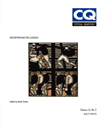
CRITICAL QUARTERLY
Connecting scholars through rigorous analysis and diverse perspectives.CRITICAL QUARTERLY, published by Wiley, is a distinguished journal that has been at the forefront of critical discourse since its inception in 1959. With an ISSN of 0011-1562 and an E-ISSN of 1467-8705, it serves as a vital resource in the fields of Cultural Studies and Literature and Literary Theory, demonstrating a commendable influence as evidenced by its placement in Q3 and Q2 quartiles respectively. The journal's impact factor, while not explicitly listed, is inferred from its reputable standing, with Scopus rankings placing it within the 54th and 29th percentiles in its respective categories. By offering a platform for rigorous analysis and diverse theoretical perspectives, CRITICAL QUARTERLY aims to foster scholarly dialogue and advance the study of literature and culture. Situated in the United States, the journal's commitment to academic excellence makes it an invaluable asset for researchers, professionals, and students dedicated to the exploration of critical theory and cultural critique.
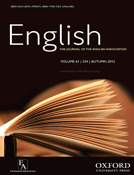
ENGLISH
Illuminating the Path of Literary TheoryENGLISH, published by Oxford University Press, is a distinguished journal in the field of Literature and Literary Theory, holding a solid place in the academic community with its Q3 ranking in the 2023 Category Quartiles. With the ISSN 0013-8215 and E-ISSN 1756-1124, this journal has been an essential platform for scholarly discourse from 2003 to 2023. It caters to a diverse audience, including researchers, academics, and students, by providing insightful articles that delve into various dimensions of English literature. While it is not an open access journal, it continues to be recognized for its valuable contributions, as reflected in its Scopus ranking of #297 out of 1106 in the Arts and Humanities, situating it in the 73rd percentile. The journal's commitment to enhancing the study of literature makes it an invaluable resource for those seeking to expand their understanding of literary theory and practice.